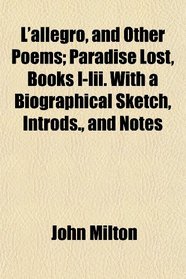Search -
L'allegro, and Other Poems; Paradise Lost, Books I-Iii. With a Biographical Sketch, Introds., and Notes
L'allegro and Other Poems Paradise Lost Books I-Iii With a Biographical Sketch Introds and Notes
Author:
General Books publication date: 2009 Original publication date: 1896 Original Publisher: Houghton, Mifflin Subjects: Literary Criticism / Poetry Poetry / General Poetry / English, Irish, Scottish, Welsh Notes: This is a black and white OCR reprint of the original. It has no illustrations and there may be typos or missing text. When yo... more »
Author:
General Books publication date: 2009 Original publication date: 1896 Original Publisher: Houghton, Mifflin Subjects: Literary Criticism / Poetry Poetry / General Poetry / English, Irish, Scottish, Welsh Notes: This is a black and white OCR reprint of the original. It has no illustrations and there may be typos or missing text. When yo... more »
ISBN-13: 9781150044564
ISBN-10: 115004456X
Publication Date: 12/19/2009
Pages: 150
Rating: ?
ISBN-10: 115004456X
Publication Date: 12/19/2009
Pages: 150
Rating: ?
0 stars, based on 0 rating




